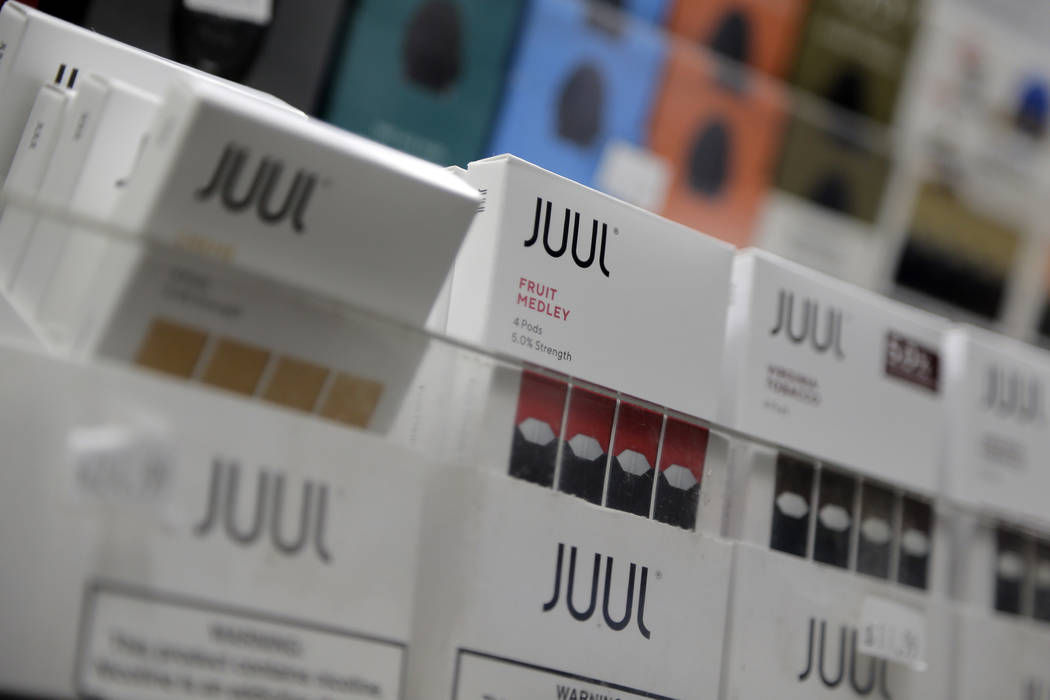Feds warn Juul about claim that e-cigarettes safer than smoking
WASHINGTON — Federal health authorities on Monday blasted vaping company Juul for illegally pitching its electronic cigarettes as a safer alternative to smoking and ordered the company to stop making unproven claims for its products.
The Food and Drug Administration also upped its scrutiny of a number of key aspects of Juul’s business, telling the company to turn over documents concerning its marketing, educational programs and nicotine formula.
The FDA action increases the pressure on the nation’s best-selling vaping company, which has been besieged by scrutiny from state and federal officials since a recent surge in underage vaping. Federal law bans sales to those under 18. The FDA has been investigating Juul for months but had not previously taken action against the company.
I am deeply concerned about the growing epidemic of e-cigarette use in our children. We need to do all we can to protect the public from tobacco-related disease and death, and prevent e-cigarettes from becoming an on-ramp to nicotine addiction for a generation of youth. @HHSGov
— Melania Trump (@FLOTUS) September 9, 2019
A Juul spokesman said the company “will fully cooperate” with the FDA.
In a sternly worded warning letter, the agency flagged various claims made by Juul representatives, including that its products are “much safer than cigarettes.” Currently no vaping product has been federally reviewed to be less harmful than traditional tobacco products, and that won’t happen for a while.
In the past year, Juul has tried to position its e-cigarettes as a tool to help adult smokers stop smoking, using the tagline “Make the Switch.” In a separate letter to the company’s CEO, the FDA said it is “concerned” that its campaign suggests “that using Juul products poses less risk or is less harmful than cigarettes.”
“Juul has ignored the law, and very concerningly, has made some of these statements in school to our nation’s youth,” said FDA acting commissioner Ned Sharpless, in a statement.
Just last Friday, the Southern Nevada Health District joined other public health authorities in warning the public against using e-cigarettes, citing the potential for severe lung illness associated with the use of the devices.
Also last week, Michigan Gov. Gretchen Whitmer moved Wednesday to make her state the first to ban flavored electronic cigarettes, accusing companies of using candy flavors and deceptive advertising to “hook children on nicotine.”
School programs discontinued
The agency’s warning letter highlights an incident recounted by two New York high school students during a congressional hearing in July. The students told House lawmakers that a representative from Juul was invited to address the school as part of an assembly on mental health and addiction issues. During the presentation, the students said the representative told them the company’s product was “totally safe.” The representative also showed students a Juul device and claimed the FDA “was about to come out and it was 99 percent safer than cigarettes.”
Juul says it discontinued its school programs — which were intended to discourage underage use — last September.
FDA warning letters are not legally binding, but regulators can take companies to court if they don’t comply with the government’s requests. Juul has 15 business days to respond with a plan for fixing the problems.
E-cigarettes have been on the U.S. market for more than a decade, but the FDA didn’t gain the authority to regulate them until 2016. E-cigarette makers have until next May to submit their products to the FDA for health reviews.
No real research on vaping
Most experts, though, agree the aerosol from e-cigarettes is less harmful than cigarette smoke since it doesn’t contain most of the cancer-causing byproducts of burning tobacco. E-cigarettes generally heat liquid containing nicotine. But there is virtually no research on the long-term effects of vaping.
The recent outbreak of lung illnesses mostly involves people who said they vaped marijuana.
In the letter to Juul CEO Kevin Burns, FDA regulators said they were “troubled” by a number of other points raised at the congressional hearing. The letter cites testimony that Juul’s advertising “saturated social media channels frequented by underage teens,” and “used influencers and discount coupons to attract new customers.”
Last year, Juul closed down its social media sites. And under pressure, it also voluntarily removed its fruit and dessert flavors from retail stores. The FDA has proposed regulations on e-cigarettes that would restrict their sales in most stores, though they have not been finalized.
In a tweet Monday, first lady Melania Trump said she was concerned about the “growing epidemic of e-cigarette use in our children.”
Formula information sought
FDA regulators also asked Juul to turn over detailed information about its potent nicotine formula. In the last year, researchers have published several papers analyzing Juul’s use of “nicotine salts,” a technique which allows users to inhale higher levels of nicotine with reduced throat harshness.
Regulators asked the company to explain why it uses nicotine salts and how this affects potential addiction.
The letter also criticizes the company for apparently turning over more documents to congressional investigators than to the agency “despite previous document requests from FDA.”

















